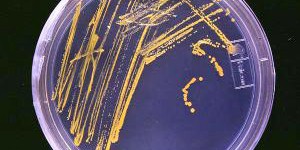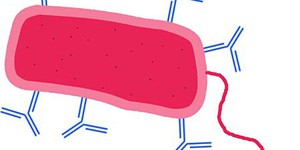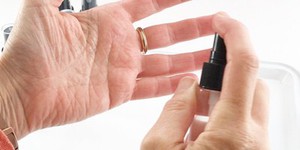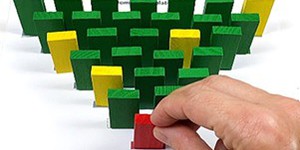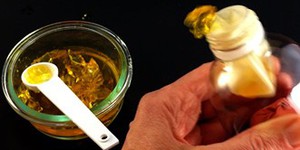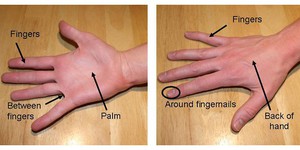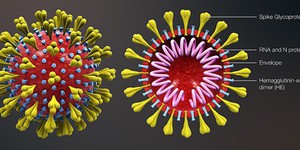Elementary School, Pandemics – COVID-19 Science Experiments (22 results)
Humanity has faced pandemics since the beginning of time. The twentieth century saw multiple influenza pandemics, and now we are facing a COVID-19 pandemic caused by a coronavirus.
Coronaviruses are not new to humans or even to you. Coronaviruses are a family of viruses best identified by the crown-like spikes that cover their surface (corona is Latin for 'crown'). Coronaviruses cause upper-respiratory tract illnesses like the common cold and the 2003 SARS and 2012 MERS outbreaks. In the winter of 2019, a new coronavirus, now officially called SARS-CoV-2, emerged in Wuhan, China. The virus made the jump from animals to humans and causes a disease called COVID-19. For some people, often children and young adults, SARS-CoV-2 causes few or no symptoms. For others it can lead to severe lung damage and even death. The virus can be spread fairly easily, including by people who are infected but display no symptoms, and as a result, we are in the middle of a global pandemic, with nearly all countries in the world reporting an increasing number of infected individuals. Scientists and health professionals around the globe are working hard to rapidly learn more about this new coronavirus and the disease it causes and to prevent the spread of COVID-19.
|
Select a resource
Sort by
|
Germs are everywhere! We try and clean our home with disinfectants, but do we really get rid of all the germs? Find out with this "hands-on" experiment.
Read more
Being sick is no fun, especially when your friends are doing exciting activities that you have to miss out on. Thankfully, common illnesses usually last for just a few days, and then you start to feel better. Why is this? It is thanks to the immune system, which is a group of special organs and cells in your body that constantly work to keep you healthy. In this science project, you will make a simple model to investigate how the immune system defends the human body from common illnesses, and…
Read more
STEM Activity
16 reviews
Did you ever wonder what hand sanitizer is made of, or how you can efficiently disinfect your hands or other frequently touched surfaces like doorknobs? Handwashing is still the best way to keep your hands clean, but hand sanitizer is a great alternative for situations where clean water and soap are not available, and you can even use it to disinfect surfaces! Intrigued—try out making a hand sanitizer yourself!
Read more
STEM Activity
24 reviews
How well do you wash your hands? Do you just give them a quick rinse with water, or do you use soap? Do you wash the backs of your hands and in between your fingers? Good hand washing is one of the best ways to prevent the spread of germs and diseases like the flu and common cold. Try this activity to find out if there are hard-to-wash parts of your hands where germs might be hiding!
Read more
STEM Activity
10 reviews
Have you ever wondered why you need to get a flu shot regularly? The vaccine protects you from getting sick with the flu, which is an infectious disease. Such diseases, like the flu or COVID-19, can easily spread through a population and cause a pandemic by making many people sick. Measures such as social distancing can reduce the risk of catching the disease, but real protection only comes from gaining immunity against the disease. This is the reason for vaccinations—to make someone…
Read more
STEM Activity
11 reviews
Have you ever coughed, felt short of breath because you were sick, or felt it was hard work to take a breath? Maybe you have watched someone gasping for air. At times, these events can feel scary! This activity explores how mucus and fluid in the lungs or airways changes our breathing using a simple lung model. It can help you understand why symptoms like coughing and being short of breath happen.
Read more
Do you wash your hands? You should— it's the best way to prevent the spread of germs. But germs can be tricky; they find nooks and crannies to hide in, so it takes good hand-washing technique to get rid of them. In this science project, you'll investigate which parts of the hand are the most difficult to wash germs off of.
Read more
Remember going to the doctor and getting vaccine shots? It is no fun getting poked with a needle, but fortunately, a vaccine helps our immune system to develop protection against a serious illness for years to come. But what about the flu vaccine? How come there is a new one every year? This science fair project will show you why.
Read more
Microbes are everywhere in our environment, but for the most part they escape our notice. This project shows you how to safely culture and study common bacteria from your everyday surroundings.
Read more
STEM Activity
39 reviews
Have you ever wondered why we wash our hands with water and soap to get rid of bacteria and viruses? Good hand hygiene becomes especially important during viral outbreaks such as the COVID-19 pandemic! The CDC (Center for Disease Control) recommendations for handwashing say to scrub your hands for at least 20 seconds with water and soap. But how does soap kill viruses such as SARS-COV-2? In this activity, you will find out by experimenting with models of different virus types to see how they…
Read more
|



